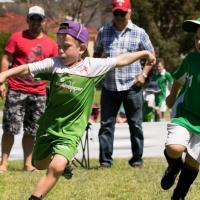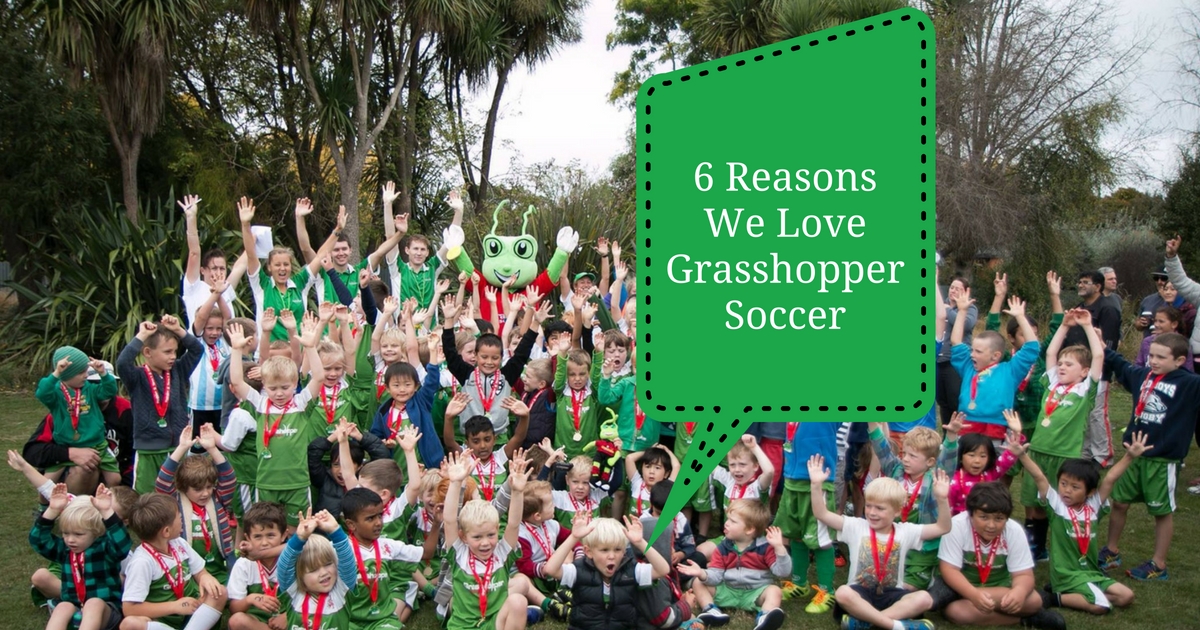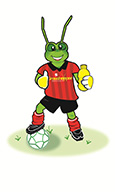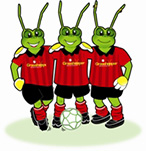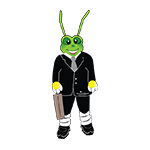Do you spend ages each week searching the house for missing shin guards, soccer socks and hurriedly making flasks of coffee in order to sit on the sidelines to watch your young ones chase soccer balls around? Let's admit it: Soccer can be time-consuming, anxiety-inducing and even costly -- for kids, parents and coaches alike. It can also be loads of fun.
Here are 6 reason we love Grasshopper Soccer:
1. Grasshopper Soccer is a better way of learning soccer!
Thirty years ago, back when we were the ones playing soccer, the coach would tell us how to kick the ball, then we'd line up and one by one, with all the other kids watching, run up to a stationary ball and try to kick it. We'd then go to the back of the line and anxiously await another chance at glory. We'd be lucky to touch the ball three times during one of those drills. The games consisted of 22 kids running amok, trying to play against each other, with the coach on the sidelines yelling instructions.
Luckily, at Grasshopper Soccer, our coaches avoid the line-them-up-and-take-turns type of drills in favour of small-sided games. They give each child a ball and make them run around a square; or break the team up into smaller groups to focus on a given skill or two; or have them play three-on-three games. This allows each player to make more soccer moves and decisions during practice, giving them more "touches" and actually practicing the skills needed to improve. For any bystander who remembers the orderly practices of their youth, it can look like a total mess. But it works.
2. Grasshopper is non-competitive for a reason.
We focus on individual skill development, no matter the skill level of the player. Our coaches give kids equal playing time and the opportunity to play different positions, which is critically important, because we don't know at that age who's going to blossom into the perfect striker. Remember, it's supposed to be fun.
3. We love support but don’t tolerate yelling.
We know how frustrating it can be to have some 16-year-old referee blow an offside call, potentially upsetting your child. We've dealt with crying kids who happened to be in goal when that fateful shot slipped into the net, in a clear violation of all soccer goodness. Please remember that our referees, coaches and assistant coaches know what they are doing! It’s not okay to yell at the coaches, even if you really disagree, and it’s unacceptable to yell at one of the kids on the other team -- even if they pushed down little Johnnie, without any regard for the rules. Let the coaches and refs handle it.
If parents must yell things, keep it positive and simple. "Go, INSERT NAME!" will cover most situations.
4. Our Grasshopper’s may not be great, but they have FUN!
Nothing is better in soccer than watching a good pass. We all want our little ones to spread out and pass the ball like Barcelona does. The reality is, they are simply not going to do that. Younger kids lack the developmental tools needed to "spread out" and see the field. Kids this age are focused on their own feet -- or on the dandelions growing in the next field. They are playing to learn how to kick the ball, to follow rules and to have fun. Passing comes later.
5. Winning isn’t everything and that’s okay.
When a team loses, the parents are often heartbroken. The kids? Not so much. Sure, they want to win. But most bounce back pretty quickly from even a lopsided loss. Grasshopper Soccer focuses on teaching our kids about fair play and sportsmanship; about hard work and teamwork; and about being healthy and active. Along the way, they may learn how to deal with adversity. If they lose, they learn how to lose with dignity; if they win, how to do so with humility. With proper coaching and practice, they will each improve their own soccer skills, becoming better players and more confident kids. That can happen on a team that wins, as much as a team that loses -- as tough as it is for many parents to take.
6. We let them play.
Finally, all of us involved in soccer -- as parents, grandparents and coaches -- should remember this simple youth soccer saying: "Let Them Play." There is always a time for instruction, for skill development and for learning the finer points of the game, that us adults can clearly understand (from the sidelines). The best way for kids to learn is to play: to kick the ball, to trap it, to pass and to shoot, to score goals, to make mistakes, to win and to lose.
Being great at soccer is a fantastic goal and we shouldn't take that dream away from any kid. But, at Grasshopper Soccer we understand that there are many more lessons to be learned. We just have to get out of the way and let them play.



 Australia
Australia New Zealand
New Zealand UK
UK Mexico
Mexico South Africa
South Africa